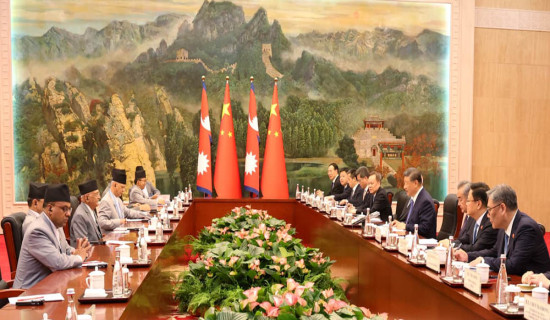- Sunday, 31 August 2025
Struggle To Secure Safe Release Of Bipin Joshi
Governments have significant hurdles when individuals are kidnapped and held captive by hostile forces in the murky realm of international affairs. The situation of the civilians imprisoned by Hamas, the militant group in charge of the Gaza Strip, serves as a striking example of this reality. One nation is failing to bring its nationals home due to a labyrinth of ineffective diplomacy, despite strenuous attempts to gain their release. Securing the safe release of individuals who are hostages overseas is considered a difficult test of a nation's commitment to its people in the field of international diplomacy. However, there are times when governments' responses come out as sluggish and ineffective compared to the seriousness and urgency of the situation.
The issue of Bipin Joshi, a citizen of Nepal, who is being held captive by Hamas, has brought to light the difficult diplomatic efforts needed to negotiate the complex web of talks, political sensitivities, and security considerations that are inherent in hostage situations. The public uproar and the heartbroken cries of the jailed person's family have not deterred criticism of Nepal's diplomatic machinery for their slow and insufficient reaction. Families wait in excruciating agony for their loved ones who are being held captive by Hamas operatives in hidden locations as the world watches in dread. The government of the impacted country must act quickly and decisively in this case. However, a feeling of passivity tends to permeate the corridors of power rather than strong and proactive steps.
Discernible advancement
Although diplomatic lines are supposedly still open, the rate of interaction is far too slow. Families are left feeling disappointed and irritated since there has been no discernible advancement in the discussions or any steps to put pressure on Hamas to release the captives. The people of the country, ensnared in captivity, represent its diplomatic lethargy and perceived helplessness in the international arena. Critics contend that the country's strategy is indicative of a larger problem with its foreign policy, which is marked by hesitation and a lack of a clear strategic vision. To safeguard the welfare of its residents overseas in the face of blatant acts of terrorism, forceful diplomacy supported by concrete actions is desperately needed. Furthermore, the seeming unwillingness to apply diplomatic pressure to Hamas sends a worrying message to other adversaries, giving them more confidence to disobey international laws without consequence. It erodes confidence in the country's capacity to protect the interests of its citizens and damages the nation's credibility.
There are several causes for this sluggishness in diplomatic relations. Among the reasons given for the delayed development are political considerations, apprehension about growing tensions, and the difficulties involved in negotiating with a violent organisation. Moreover, attempts to reach a settlement have been made more difficult by the absence of a coherent and well-coordinated plan. The lackadaisical reaction from Nepal compromises not just the security of its citizens but also the country's standing internationally. Moreover, the consequences of inert diplomacy go beyond the urgent humanitarian issues. It damages the government's reputation internationally and erodes confidence in its capacity to defend its nationals overseas. In an increasingly globalised world where security risks are cross-border, maintaining national interests and core values requires a strong and assertive diplomatic stance. The government's inability to act decisively to safeguard its citizens sends a worrying message that would give future offenders more confidence.
Resolute action
Conversely, some countries in comparable situations have adopted more forceful and proactive strategies. To ensure the safe release of their individuals, they have used all possible channels, including diplomatic ones and international collaboration. These efforts contrast sharply with Nepal's passivity in the face of disaster. The government of Nepal has promised to step up its efforts to obtain the release of its citizen in response to growing pressure. But for real progress to be accomplished, words must be accompanied by resolute action. There's not much time left, and each day that goes by puts the abducted person's safety and wellbeing in jeopardy. Ineffective diplomacy is a major barrier to the prompt and efficient settlement of hostage situations. In order to secure the return of their nationals who are kidnapped, Nepal and other countries need to take note of the lessons that have been learnt from previous mistakes and take a proactive and resolute approach.
The only way to address and eradicate the plague of hostage-taking is with coordinated diplomatic efforts and unflinching commitment. With such serious obstacles before us, as a country, we cannot afford to be complacent. In order to ensure that our compatriots are safely returned from the grip of terrorists, our diplomatic efforts must be prompt, resolute, and unrelenting. Anything less would be an insult to those who depend on their government to stand by them and help them through difficult times. Not only does the slow response to this kidnapping compromise the safety of the individual in question, but it also damages Nepal's reputation internationally. Maintaining the values of justice, human rights, and international law as well as securing the safe return of the kidnapped individual need a proactive and forceful diplomatic approach.
(The author is an advocate.)

















